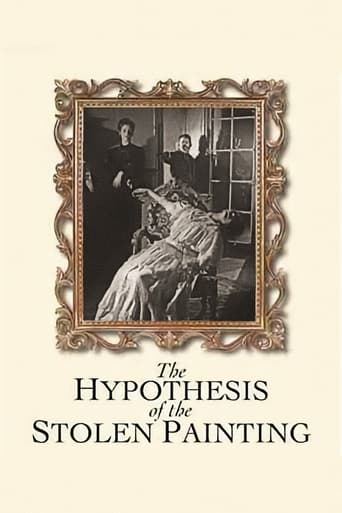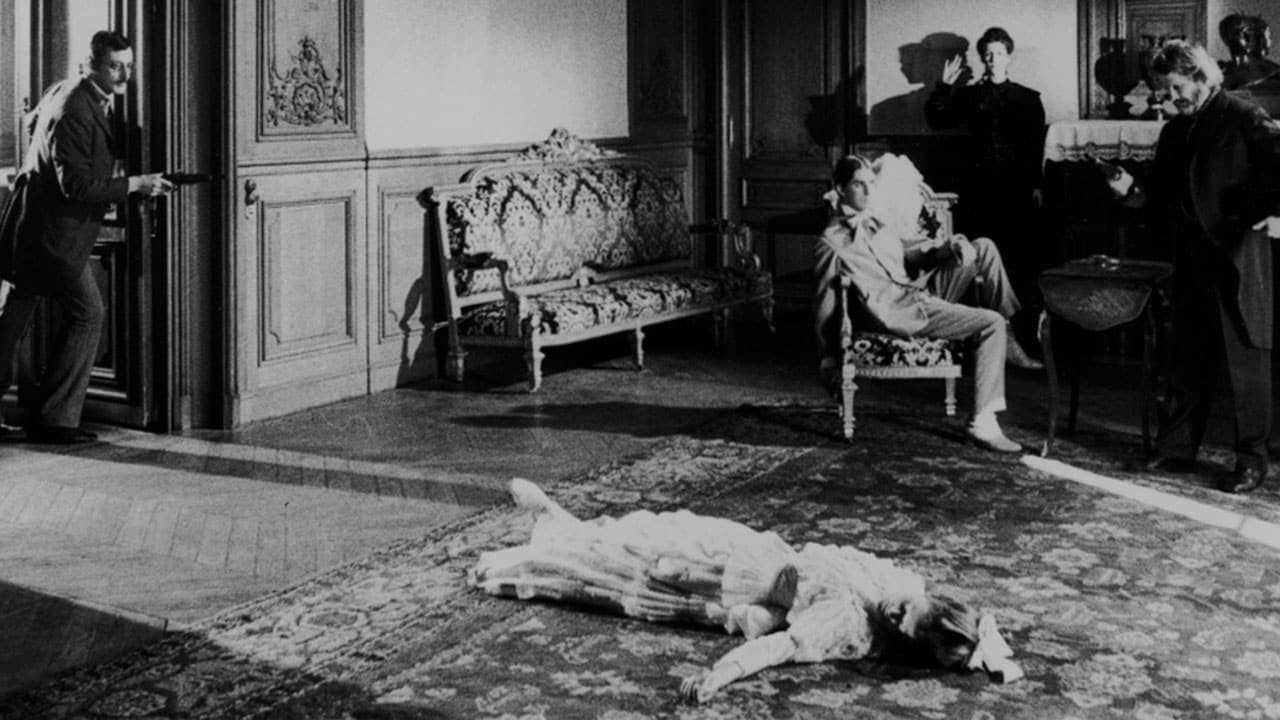Gloede_The_Saint
I must say I was impressed the cinematography was amazing, the frames close to perfection and the way he built up the tension around a subject that sound more like a dreadful bore is beyond be.The film is about two narrators, one seen, one unseen. They are both trying to explain the significant of a series of painting that caused a scandal a long time back. The film is all about theories and explanations of views but the conclusion is quite shocking I must say. Definitely a film that deserves more than it's 171 votes.With only 66 minutes to play out it's plot the film still felt like a complete work. Fantastic direction! I must say far better than Blood of the Poet which it for some strange reason remind me a bit of. I suppose you can call it by the slang word "artsy". It's pretty much just a lot of professional talk about various theories and stunning visual effects but the crew and Ruiz did pull it off. At least for me. An amazing film.
OldAle1
L'Hypothèse du tableau volé/The Hypothesis of the Stolen Painting (1979) begins in the courtyard of an old, three-story Parisian apartment building. Inside, we meet The Collector, an elderly man who has apparently devoted his life to the study of the six known existing paints of an obscure Impressionist-era painter, Tonnerre. A narrator recites various epigrams about art and painting, and then engages in a dialogue with The Collector, who describes the paintings to us, shows them to us, tells us a little bit about the painter and the scandal that brought him down, and then tells us he's going to show us something....As he walks through a doorway, we enter another world, or worlds, or perhaps to stretch to the limits, other possible worlds. The Collector shows us through his apparently limitless house, including a large yard full of trees with a hill; within these confines are the 6 paintings come to life, or half-way to life as he walks us through various tableaux and describes to us the possible meanings of each painting, of the work as a whole, of a whole secret history behind the paintings, the scandal, the people in the paintings, the novel that may have inspired the paintings. And so on, and so on. Every room, every description, leads us deeper into a labyrinth, and all the while The Collector and The Narrator engage in their separate monologues, very occasionally verging into dialogue, but mostly staying separate and different.I watched this a second time, so bizarre and powerful and indescribable it was, and so challenging to think or write about. If I have a guess as to what it all adds up to, it would be a sly satire of the whole nature of artistic interpretation. An indicator might be found in two of the most amusing and inexplicable scenes are those in which The Collector poses some sexless plastic figurines -- in the second of them, he also looks at photos taken of the figurines that mirror the poses in the paintings -- then he strides through his collection, which is now partially composed of life-size versions of the figures. If we think too much about it and don't just enjoy it, it all becomes just faceless plastic....Whether I've come to any definite conclusions about "L'Hypothèse du tableau volé", or not, I can say definitely that outside of the early (and contemporaneous) works of Peter Greenaway like "A Walk Through H", I've rarely been so enthralled by something so deep, so serious, so dense....and at heart, so mischievous and fun.
tedg
There's a blanket term in film criticism, reflexivity. Its an odd word. It denotes something where outside and inside are merged or mixed, where viewer and viewed overlap. And yet the word itself is not reflexive, it stands aloof. While the root comes from reflection, and the direct form would be reflective, the whole thing smacks of an invented concept that sterilizes the user from the phenomenon it denotes.Its a word that drives me a bit crazy, in part because it is applied to several different types of things that have little to do with one another. The concept as used by the most prominent writers just appears as if it were built into the universe as some by-product of intelligent design, a sort of natural effect like dreaming that writers can reference.I've tried to repair that by redefining a larger class of effects as "folding," teasing out the various types, and attempting to explain why they were invented and to serve what narrative utility. Without this, you get philosophical notions that are refined away from life; and then artists that quote those refined sugars in art as if they really indicated life. Like we have here.I've decided to get into Ruiz in a serious way. I saw his corner of Swann's Way and was impressed. Reader emails have indicated that he shares space with Greenaway, who I admire. So I went with this because it is supposed to be his most abstract and "pure." It is photographed by perhaps the best folded cinematographer who has ever lived.I admit, it is clever, in a "Saragossa Manuscript" sort of way. We have several levels: us; our disembodied narrator; our on-screen narrator; a collection of actors that in a simple movie would be giving us a story and here do tableaux instead; our painter that is a narrator in seven paintings; and under that a score of narrators-in-life: families, religions and societies in knots.The idea, the folding, is that these layers merge and shift one into another.With a little work, you can get the point, and it is a worthwhile one.But you can do this, all of it, with even more bizarrenesses without draining the blood and breath out of the thing. It is possible to fold all that into life and present us edges of that life, stuff that sweeps us in and gives us the stuff of structured dreams. This is an essay with some artistic vocabulary; it isn't art.Damn the French for messing us up so. I'm sure Ruiz eventually found his way to judge from what I saw of his Proust. But this. Its worth watching as an exercise, but if you are looking for bits of cinematic bone and flesh from which to construct your being, look elsewhere. This is a cadaver.Ted's Evaluation -- 3 of 3: Worth watching.
Michael Bennett Cohn
This is a strange, cerebral, surreal, esoteric film. If there is such a thing as "intellectual horror" cinema, this film is it. I started to get scared and wish there was someone else watching it with me, and it barely has a plot! I'm going to have to see this film again multiple times before I feel I really understand it. If you're the kind of person who likes "My Dinner With Andre" and films by Godard, or if you do a lot of mind-altering drugs, you will probably enjoy this film. Wow.


 AD
AD



